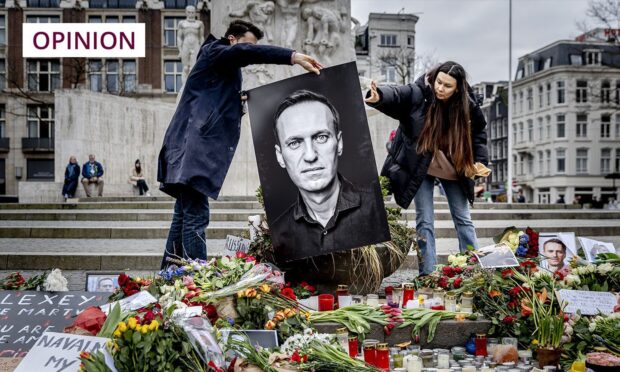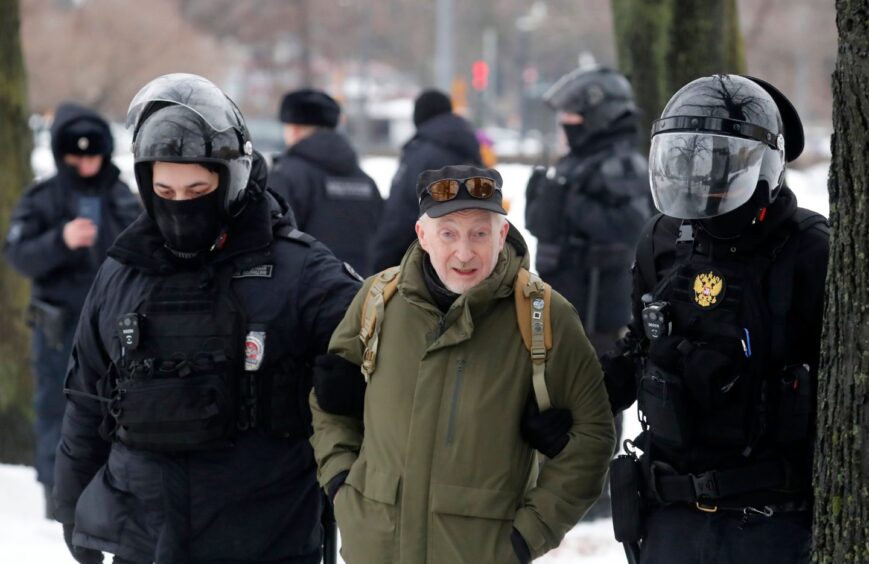It was striking in the aftermath of Alexei Navalny’s death how many images there were of isolation.
A lone Navalny, pale yet defiant, pictured behind bars in his Siberian prison. Later, a solo, placard-waving protestor, was dragged violently to a van by Russian police, his body tumbling awkwardly towards snowy pavements, arms rising in defence.
Individuals hurriedly placed single red roses in memory of a brave man, before scurrying away, waved on by police who barely tolerated their respect.
Sweetly impotent gestures, made too late, a reminder that humanity’s greatest power would come when people recognised where that power lay: in the arms of the collective.
The Russian author and dissident, Alexander Solzhenitsyn, had a similar thought.
“What would things have been like (in Russia),” he said, “if during periods of mass arrests, people had not simply sat there, paling with terror at every bang on the downstairs door, and at every step in the staircase, but understood they had nothing to lose and had boldly set up in the downstairs hall, an ambush of half a dozen people?”
Dissidents emerge like flowers in dirty ditches, sporadically rising above muddy waters to brighten their dank surroundings.
Navalny was inspirational in his defiance, returning voluntarily to Russia after narrowly surviving a poisoning attempt, knowing he would be incarcerated or killed by Putin’s regime.
Navalny was dangerous because he couldn’t be controlled
Inevitably, he was plucked out like a weed. He was dangerous because he could not be controlled, but most of us have been: by indifference, by impotence, but most crucially by fear. “Be scared of nothing,” Navalny urged, knowing fear was the greatest barrier to change.
In fear, history has shown us, lies the abuser’s power. When Neville Chamberlain returned from Germany in 1938, waving the Munich agreement and claiming “peace in our time”, the global fear of another war drove appeasement.
Fear, too, drove the holocaust, though there was plenty of bravery in networks of resistance.
Stories like that of the German woman, who told the Gestapo her Jewish neighbour’s child was her own so that the child would not be taken to the death camps, are inspirational. But as beautiful as individual acts of bravery are, their real power lies in harnessing collective action.
Navalny’s wife, Yulia, recognises that. Speaking this week on the YouTube channel her husband started, she was a stony study of grief and rage.
By killing her husband, she said, Putin killed half of her. “Half of my heart and half of my soul. But I still have the other half. And it tells me I have no right to give up…Share not just my grief but my anger, my rage, my hatred,” she urged the Russian people. Change would follow.
How long, Ukraine’s Volodymyr Zelensky asked recently, is the world going to allow Putin to be Putin?
It is part of a bigger question. How long will the world’s people continue to invest their power in those who abuse it?
Sanctioning the slaughter of innocent children in Gaza. Deferring to Netanyahu for fear of being deemed antisemitic. (Discriminating against Jewish people, simply because these are Jews, is antisemitic. Criticising the political decisions of the Israeli government is not.)
Tolerating leaders who overstep their remit. Unless self-interest is involved in world action, there is inertia. All it takes for evil to flourish, Navalny used to remind us, is for good people to do nothing.
So, the world plays its part. Ironically, despite global communications giving us increased knowledge, we have dissipated power.
We have emphasised individuality and personal rights, perhaps at the expense of community.
Solzhenitsyn once commented that a decline in civic courage was the most striking feature of Western society. “Such a decline,” he argued, “is particularly noticeable among the ruling and intellectual elite, causing an impression of a loss of courage by the entire society.”
Message around Navalny’s death is simple – resistance is futile
Navalny’s death was timed prior to Russian elections. The message to the Russian people – and the world – is clear. Do not dissent. Resistance is futile.
But while Navalny’s death was intended to close opposition down, instead, it should open up possibilities: the knowledge that Russian people have the power to live differently if they choose unity over fear. “I am not afraid and I urge you not to be afraid,” Yulia Navalny says.
Hundreds were eventually arrested for laying flowers for Navalny. One woman said it was important to know other people felt as she did.
“It’s a shame that….people come and go, and you can’t see all the people who came throughout a day…but you can see the flowers.”
How much power there would be if all the individual acts of bravery were gathered together like a bouquet of those flowers?
It is now for the world – but especially the Russian people – to ensure that Yulia Navalny does not meet her husband’s fate: the tall poppy chopped down because it stands out.
The flowers currently being laid for Navalny are seeds that must surely bloom in a field too plentiful to pluck.
Catherine Deveney is an award-winning investigative journalist, novelist and television presenter



Conversation